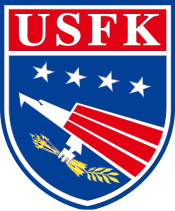U.S.–South Korea Status of Forces Agreement
| Agreement Under Article IV of the Mutual Defense Treaty Between the United States of America and the Republic of Korea, Regarding Facilities and Areas and the Status of United States Armed Forces in the Republic of Korea | |
|---|---|
 | |
| Signed | July 9, 1966 |
| Location | Seoul |
| Effective | February 9, 1967 |
| Parties | |
| Language | English |
The U.S.–South Korea Status of Forces Agreement (Hangul: 주한 미군 지위 협정; Hanja: 駐韓美軍地位協定, SOFA), formally Agreement under Article IV of the Mutual Defence Treaty between the Republic of Korea and the United States, Regarding Facilities and Areas and the Status of United States Armed Forces in the Republic of Korea, is an agreement between South Korea and the U.S. approved and enacted in 1967 and revised in 1991 and 2001. It is a status of forces agreement that concerns the treatment of United States Forces in South Korea. Lt. General Jan-Marc Jouas is the U.S. representative to the joint committee on the Status of Forces Agreement.
Part of the U.S military South Korean SOFA is that all military personnel will be either 1. In there assigned military off post civilian quarters or 2. On a U.S. military post between the hours of 0100-0500. The only policy exception is those conducting missions performed under normal military operation. Those caught violating the 8A readiness recall policy are subject to discipline measures under normal Uniform Code of Military Justice (UCMJ).
Anti-American Sentiment
The U.S.-South Korea Status of Forces Agreement plays a part in the widespread anti-American sentiment. The agreement's promotion of U.S military presence in South Korea has served as a catalyst for many base expansion protests such as the Daechuri Protests which was a 2005/6 protest against the expansion of U.S. military base Camp Humphreys.
See also
External links
| Wikimedia Commons has media related to United States Forces Korea. |
- Current USFK SOFA Documentation – United States Forces Korea Public Portal